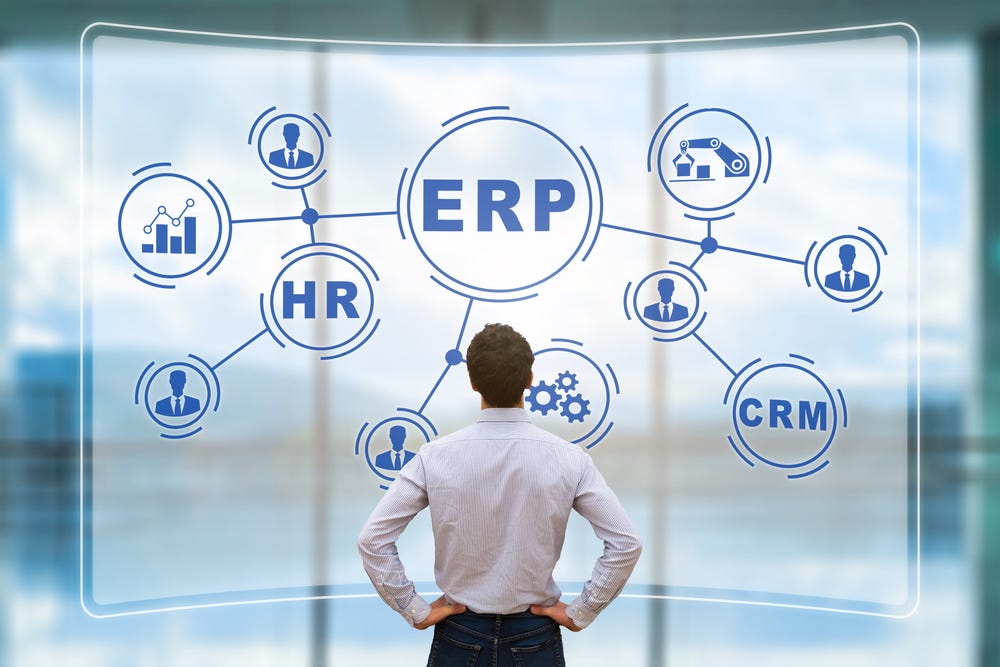
ERP System
What Is ERP?
ERP stands for Enterprise Resource Planning.
ERP integrates the core processes of a company such as HR, finance, Operations, Sales & Marketing activities into a single system. ERP brings all the processes to communicate seamlessly with each other in real time.
Let’s look at an example to understand this,

Distribution ERP System
Distribution: A Semi trailer-truck is driving up the road to a distribution center to deliver the load. As the truck pulls off the highway and enters the gate at the distribution center, Scanners read the identification number on the truck and transfer the information to the ERP system.
ERP System instantly matches the ID in the database and then to several purchase orders expected from the supplier, all in real time and then determines the optimal dock door for this delivery.
As the truck keeps rolling, within few seconds driver is informed to take the truck to dock number 23.
An Intelligent ERP system manages distribution efficiently by delivering the load where it will be stored & also driver’s time as he need need stop at an office to check in.
Why ERP Is Critical For Your Business?

Allows in-depth insights: Make data-driven decisions and get answers to critical business questions.
Real-time Reporting: Improve the efficiency and performance of your business by acting on the insights.
Lower Risk: Reduce risks by thorough financial controls, compliance and improved data integrity.
Efficient Tracking: Save time and money by automating the tracking of your inventory across the warehouses.
Project Efficiency: Optimize project costs and planning.
Uniformity of Data: Consistent infrastructure and data across platforms and systems.
Modules Of ERP:
Below are some of the most crucial modules that are found on the ERP system

Modules of ERP
Finance: Enables organizations to manage cash flows and allows them to track financials of the company which includes payments, expenditures, bank statements and more.
Operations: Provides end-to-end visibility throughout Supply chain, inventory, production cycle & enables organizations to centrally manage operations across sales channels.
Marketing & Sales (CRM): Sales & Marketing module includes multiple features to manage everything from Lead generation, direct mailing campaign, handling pre-sales and sales activities, sales order processing , sales force automation to order tracking through status and transaction reports etc.
HR & Talent: Streamlines the management of talent, human capital, payroll, performance & more.
ERP Implementation:
ERP implementation is categorized into three different categories: Cloud, On-premise & Hybrid
- Cloud ERP: Cloud ERP is the most commonly used implementation. It helps organizations access cutting-edge technology, control costs and complexity, and improved IT productivity.

- No upfront payment required unlike On-premise.
- No additional investments in hardware and IT.
- Quicker to implement & more stable along with continuous software updates.
- On-Premise: ERP software is installed locally on the servers. Usually, on-premise installation requires a large one-time up-front fee for the licensing, with recurring fees needed for updates and customer support.
Pros:
- More customization & greater control on the implementation.
- The data security is in the hands of the company itself.
Cons:
- Upfront investment is required.
- Recurring IT and hardware costs.
- Data security protocol might not be up to date.
- Implementation is more complex and takes longer as compared to cloud based solution.
Are you using On-premises Microsoft Dynamics? Then you’re ready for the cloud migration. Explore Cloud ERP Software
- Hybrid ERP: As the name suggests, it is a hybrid of on-premise and cloud ERP system. Organizations can run some of their critical business data on-premise and gain advantage of the Cloud ERP for other massive data.
Are You Ready For ERP? — Let’s Find Out
If your business has been steadily growing, there is a great chance that you have outgrown the simple tools such as excel spreadsheets to manage different processes.
You spend a lot of time on daily activities: With ERP integration, you would have a single interface to control and communicate with different business units.
Lack of data: You miss out on fast-moving opportunities as you don’t have access to real-time data.
Inconsistency: Your departments are using different applications for data entry.
Losing track of your business: It’s getting harder for you to manage your clients and keep track of your processes.
About Us: Infusai is an end to end Microsoft business and platform service provider. We design, build, implement and support enterprise CRM, ERP solutions & custom applications.




